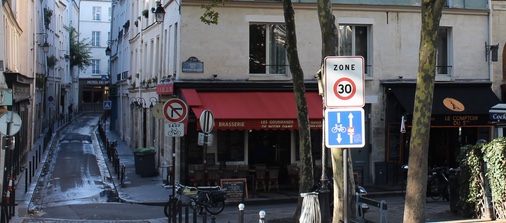To start at the beginning of the story go here.
Simon knew something was different the moment I walked into his cafe. He was invariably the same – bald head, white shirt, cigarillo in breast pocket, waist covered with an apron. His eyes, though, narrowed as I strode in. It might have been that I was dressed differently than most days – I wasn’t worried about making a shift at the casino, so the black trousers had been exchanged for jeans and I didn’t bother tucking in the Oxford shirt. I don’t think that was it, though.
He smiled at me in a way that he hadn’t before, like he might at a mischievous child that he caught doing something he didn’t necessarily disapprove of. He took the rag out of his apron strings and smacked it into his other hand, as if considering spanking me.
I found my internal landscape being plainly apparent to the outside world wholly irritating, though, and I gave him a gruff, “What?” That I had to suppress grinning back at him only made it worse.
Smile unswerving, Simon responded with a, “Bonjour,” and bowed slightly, hands indicating the table at the rear. Walking to it, I saw myself in the mirror on the wall above and even I had to admit it was obvious something had changed. Despite having to keep an eye out for wayward Russians on the way to the cafe I had heard a slight tune in my head, some little ditty that now, in the safety of the cafe, I remembered Cheryl humming when at mundane tasks that made her happy. This conjured an image of her painting, the summer light of a Colorado afternoon surrounding her as she worked in the spare room we were going to make a nursery. It came so clear and so suddenly into my mind that I had to grab the back of a chair to keep my balance.
This banished Simon’s grin and he stepped closer, asking if I was alright. I nodded, moving to sit while making faint, reassuring gestures. Simon swiveled his head as he said, “Where is your lady friend?”
“She’s sleeping,” I answered without thinking.
This caused his grin to reappear, so bright it shined through the years of smoker’s grit on his teeth. The impish expression suggested that he thought my weakened state might have something to do with Sophie. “Did you tire her out?”
That was welcome as a playful elbow to the ribs, bringin my irritation to its feet. In a fit of rudeness I asked for the mobile before even ordering coffee.
That flipped Simon’s switch instantaneously, moving him from comrade to curmudgeon. I returned his stare, waiting for the judgment to pass and, when it didn’t, saying, “The world doesn’t change in day.” I think it pleased him that I said it in French.
Still unhappy, though, Simon stood up straight and shuffled himself back into his kitchen. A few minutes later he came back with an espresso, setting the mobile down next to it. Rather than join me he walked away to sit down on one of his stools and opened the morning paper. He could have been a part of the furniture, if furniture fumed.
I sipped my coffee and picked up the phone, staring at it until the caffeine overcame my inertia and I dialed the number for Rotella. It buzzed in the high, European way, enough times that I began to doubt anyone would answer. Just as I thought I might escape dragging anyone else into this, the line picked up. “This is Inspecteur Rotella.” Whether it was the early morning or just Rotella’s constant state, the voice echoed with fatigue as if issuing from a deep cave.
I had practiced what I was going to say, but found that the subterranean and honest voice at the end of the line caused me to lose all of that. Instead I stupidly repeated his name back to him and said, “Atwell gave me your number. He said we should talk. I have some information that might interest you.”
Rotella gave a low growl that told me his opinion of the local representative of the American intelligence community. “I hope you are more useful than that supine.”
“I’m a journalist from the Kansas City Star. Why don’t you let me buy you breakfast and I can tell you all about it?”
I was gambling that, like most French civil servants, Rotella wouldn’t be adverse to the idea of a free meal. Nonetheless, he grumbled, “What would an American know about food?”
“I didn’t say I was going to cook for you, Inspector,” I replied and gave him the address. He grunted dubiously, perhaps recognizing it as being in Les Moulins, but I assured him it’d be worth his time, even if just for the chow.
When I hung up I decided I couldn’t wait for breakfast and I ordered my usual. Simon separated from his stool to disappear into the kitchen. While I waited, a young couple walked in, looked around, saw me, thought better of it, and left.
When Simon brought breakfast, he set the plate of eggs galette in front of me without giving any indication he had seen or cared about the backpackers. The food was good enough that my eyes kept trying to wander from the cafe’s entrance to the ceiling. I thanked Simon and he moved to sit with me, lighting a cigarillo as he watched me enjoy his creation. We sat in silence while I tried not to shovel the food into my face like this was a mess hall. I told him, in French, I was waiting for someone and we turned that into my morning French lesson, talking around the participles of time, point of origin, and other things I answered in a vaguely French way.
The second espresso had begun to work its caffeinated wonder when I spotted a mop of black hair on top of a French frame enter the cafe. The aviator sunglasses and mustache screamed cop. His shirt and tie were disheveled, and I would swear he was wearing cowboy boots. The bell above the door jingled at his arrival, causing Simon to glance up to the mirror. Confirming, I’m sure, what he already suspected, I said, “That must be him.”
Simon rose from his seat, clearing off whatever imaginary dust he had left behind with a few smacks of his towel, acting as if he had just been keeping it warm. He smiled at the inspector, crossing the cafe to welcome him in a much friendlier way than I would have expected anyone to get.
Rotella’s entrance was as rigid as the door handle, but he relaxed as Simon’s approach introduced a domestic familiarity into this strange and unexpected rendezvous. He waggled his mustache and removed his sunglasses, inquiring to Simon in words I didn’t hear. I’m certain this was out of politeness – Rotella had already spotted the lone American at the back of the cafe.
Simon indicated the rear table. As Rotella closed the distance I noted that I was right – he was wearing cowboy boots. I decided this was a good sign.
I stayed where I was, giving the inspector all the time he needed. His stride slowed in the last few yards, stopping completely a few feet from the table. “You are not from The Kansas City Star.”
“No.” I thought to stand and then didn’t, the tension coming from Rotella holding me in place. “I work with Atwell. I think you can understand why I might not want to admit that.”
























